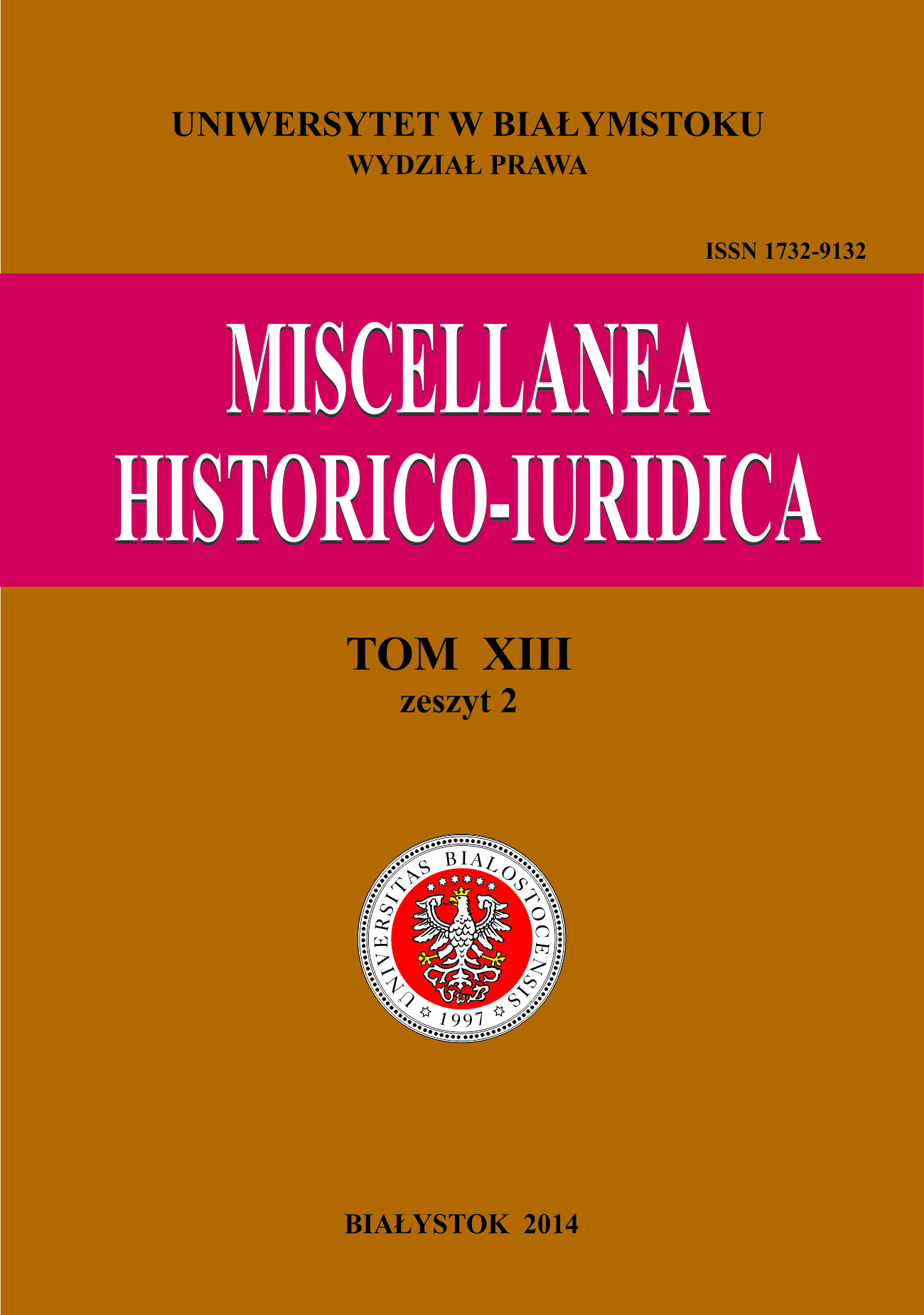Concubinage as a source of the matrimonial impediment of public propriety in Canon Law
Keywords:
concubinage, impediment of public propriety, canon lawAbstract
The article discusses concubinage as a source of matrimonial impediment of public propriety (impedimentum publicae honestatis) in Canon Law. According to Canon 1093 of the Code of Canon Law from 1983 and Canon 810 Code of Canons of Oriental Churches from 1990, the impediment of public propriety arises from notorious or public concubinage. It nullifies marriage in the first degree of the direct line between the man and the blood relatives of the woman, and vice versa. Concubinage means a cohabitation between a man and a woman established on a more or less durable basis without a valid marriage. It’s unimportant whether the parties live in the same house or not. Concubinage is considered public when it is known in the community of the faithful, notorious when it is publicly known and carried out in such circumstances that it cannot be concealed or excused. Public propriety is an impediment of ecclesiastical law, hence can be dispensed by the local ordinary (Canon 1078 § 1 of the Code of Canon Law) and by the local hierarch (Canon 795 of the Code of Canons of Oriental Churches) in ordinary circumstances, and also by the persons mentioned in canons 1079–1080 of the Code of Canon Law and canons 796–797 of the Code of Canons of Oriental Churches in exceptional circumstances. It should be noted that even if notorious or public concubinage ceases through the death of one of the parties or by mutual agreement, a dispensation is necessary.
References
Ayrinhac H.A., Lydon P.J., Marriage Legislation in the New Code of Canon Law, New York 1946.
Bączkowicz F., Prawo kanoniczne. Podręcznik dla duchowieństwa, t. II, wyd. 3, uzupełnili i przygotowali do druku J. Baron i W. Stawinoga, Opole 1958.
Biskupski S., Prawo małżeńskie Kościoła rzymskokatolickiego, Warszawa 1956.
Bobrowski F., Słownik łacińsko-polski, t. I, Wilno 1841.
Bouscaren T.L., Ellis A.C., Canon Law. A Text and Commentary, Milwaukee 1951.
Bride A., honnêteté publique, [w:] Dictionnaire de droit canonique, t. V, Paris 1953.
Brunest E., Etude sur l’empêchement d’ honnêteté publique, Paris 1911.
Buonanno M., De canonico publicae honestatis impedimento. Synopsis historica ac commentarium doctrinale in can. 1078 C. I. C., Napoli 1973.
Cappello F.M., Tractatus canonico-moralis de sacramentis, t. V: De matrimonio, wyd. 7, Romae 1961.
Chelodi I., Ius matrimoniale iuxta Codicem Iuris Canonici, wyd. 3, Tridenti 1921.
Codicis Iuris Canonici Fontes, t. VII, oprac. I. Seredi, Romae 1935.
Dauvillier J., De Clercq C., Le mariage en droit canonique Oriental, Paris 1936.
Fornés J., Przeszkody zrywające w ogólności, [w:] Kodeks Prawa Kanonicznego. Komentarz, edycja polska na podstawie wydania hiszpańskiego, red. Naukowa P. Majer, Kraków 2011.
Gallagher J.F., The Matrimonial Impediment of Public Propriety. A Historical Synopsis and a Canonical Commentary, Washington 1952.
Galtier F., Le mariage. Discipline orientale et discipline occidentale. La Reforme du 2 Mai 1949, Beyrouth 1950.
Gasparri P., Tractatus canonicus de matrimonio, t. I, Vaticano 1932.
Góralski W., Małżeństwo kanoniczne, Warszawa 2011.
Grabowski I., Prawo kanoniczne według nowego Kodeksu, wyd. 2, Lwów 1927.
Guarino A., Adfinitas, Milano 1939.
Hage A., Les empechements de mariage en droit canonique oriental. Etude historico-canonique, Beyrouth 1954.
Jombart E., concubinage, [w:] Dictionnaire de droit canonique, t. III, Paris 1942.
Jone H., Commentarium in Codicem Iuris Canonici, t. II, Paderborn 1954.
Jougan A., Słownik kościelny łacińsko-polski, Warszawa 1992.
Kupiszewski H., Quasiadfinitas w prawie rzymskim, „Roczniki Teologiczno-Kanoniczne” 1963, z. 4.
Lefebvre C., De impedimentis dirimentibus in genere, [w:] Commento al Codice di Diritto Canonico, a cura di P. V. Pinto, Città del Vaticano 2001.
Lempa F., Kompetencje, uprawnienia i obowiązki w Kościele katolickim, Białystok 2013.
Misztal-Konecka J., Incestum w prawie rzymskim, Lublin 2007.
O’Mara W.A., Canonical Causes for Matrimonial Dispensations, Washington 1935.
Pawluk T., Prawo kanoniczne według Kodeksu Jana Pawła II, t. III: Prawo małżeńskie, Olsztyn 1996.
Paździor S., Konkubinat w prawie kanonicznym oraz w polskim prawie cywilnym, „Roczniki Nauk Prawnych” 2007, nr 2.
Pelczar J., Prawo małżeńskie katolickie z uwzględnieniem prawa cywilnego obowiązującego w Austryi, w Prusach i w Królestwie Polskiem, Kraków 1882.
Pieńkos J., Słownik łacińsko-polski. Łacina w nauce i kulturze, Kraków 2001.
Pospishil V.J., Code of Oriental Canon Law. The Law on Marriage, Chicago 1962.
Roberts R.P., Matrimonial Legislation in Latin and Oriental Canon Law, Westminster 1961.
Rocznik Statystyczny Rzeczypospolitej Polskiej 2013, Warszawa 2013.
Sabbarese L., De impedimentis dirimentibus in genere, [w:] Commento al Codice dei Canoni delle Chiese Orientali, a cura di P.V. Pinto, Città del Vaticano 2001.
Słownik łacińsko-polski, red. M. Plezia, t. II, Warszawa 1998.
Słownik łacińsko-polski do użytku szkół średnich, red. B. Kruczkiewicz, Kraków 1907.
Sondel J., Słownik łacińsko-polski dla prawników i historyków, Kraków 1997.
Sztafrowski E., Podręcznik prawa kanonicznego, t. IV, Warszawa 1986.
The Code of Canon Law. A Text and Commentary, edited by J.A. Coriden, T.J. Green, D.E. Heintschel, New York 1985.
Vermeersch A., Creusen J., Epitome iuris canonici cum commentariis ad scholas et adusum privatum, t. II, wyd. 4, Brugis – Bruxellis 1930.
Wahl F.X., The Matrimonial Impediments of Consanguinity and Affinity. An Historical Synopsis and Commentary, Washington 1934.
Wernz F.X., Vidal P., Ius canonicum, t. V: Ius matrimoniale, wyd. 3, Romae 1946.
Woroniecki A., Przeszkoda małżeńska przystojności publicznej w rozwoju historycznym, „Wiadomości Diecezjalne Łódzkie” 1934, nr 4; 1935, nr 1.
Żurowski M.A., Kanoniczne prawo małżeńskie Kościoła Katolickiego. Stan prawny po promulgowaniu Kodeksu Prawa Kanonicznego Kościoła łacińskiego w 1983 r., Katowice 1987.







